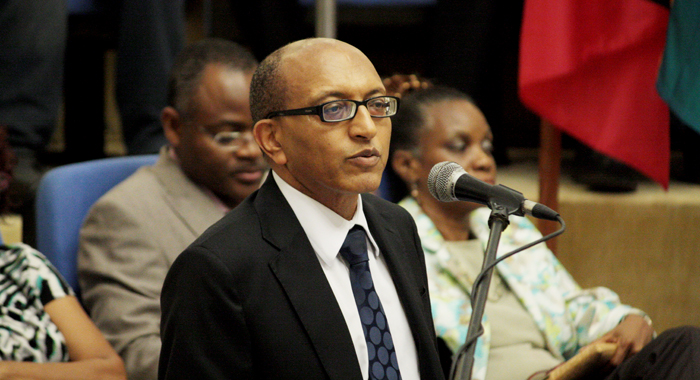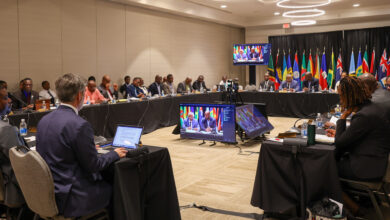Please allow me to thank you, Mr. President for inviting us to attend the 13th Caribbean Week of Agriculture in your beautiful country, Suriname. I am grateful for the warm welcome and generous hospitality extended to us since our arrival in Paramaribo.
2014 is a very special year for us in many different ways. It is an important year for smallholder farmers across the world as it is the International Year of Family Farming, which is also the main theme of the 13th Caribbean Week of Agriculture. It is a special year for island countries as it is the United Nations Year of Small Island Developing States that culminated in a very successful conference in Samoa last month. For CTA 2014 marks our 30th Anniversary, and we are using the occasion to take stock of our past achievements with our partners and to re-dedicate our efforts to serving smallholder farmers across Africa, Caribbean and the Pacific.
CTA has been actively involved in the Caribbean Week of Agriculture since 2003, and we greatly value the opportunity it offers us for meeting the key players in the region when it comes to agriculture and rural development, be they policy-makers, researchers or farmers. It is the farmers and fisherfolk who are on the frontline when it comes to food security and nutrition and the stewardship of our most precious natural resources. And it is mainly their livelihoods and prosperity that we hope to benefit by the progress we make this week.
I like to think that CTA’s interventions in the Caribbean are adding value to what other key players are already pursuing in the region.
Our special focus is on sharing knowledge and building capacity, ensuring that the challenges smallholder producers face in the Caribbean are properly understood, whether they are caused by climate change, or lack of access to markets, finance and technology, or, as often happens, a combination of all of these.
The CWA is an important event that allows the region's agriculture stakeholders to meet and exchange views, creating valuable opportunities for cross-learning and joint analysis, as well as collective action. That is why we choose to stage some of our most important events here. CTA is sponsoring a total of over 120 participants at this year's CWA representing a wide range of stakeholders.
One important area of our work is promoting cross-learning among the ACP regions. They may be thousands of kilometres apart, but the Caribbean and Pacific countries have much in common, including similar challenges facing their agricultural sectors. In many cases, these countries can really learn from each other about what works and where.
This year, we have invited the Minister of Agriculture from Vanuatu, his Director General, and staff from the South Pacific Comission to see for themselves the lessons to be learned from the CWA, in their quest to launch a Pacific Week of Agriculture in 2015.
Family farming is the focus of this year’s CWA. We are here to explore how to make conditions better for smallholder farmers who are the backbone of food production in the Caribbean, just as they are in other ACP regions.
There is also another important dimension to family farming. I’m talking about young people and the role that they should and can play in supporting agricultural development, in light of an ageing farmer community in the Caribbean and across the ACP.
That is why we at CTA are making a special effort to encourage young people to engage in agriculture – in ways that they can relate to, using new technologies that are far removed from the old image of farming. For example, this week we are showcasing two competitions that are particularly aimed at youth and at the innovative contributions it can make to agricultural and rural development in the Caribbean.
One of these is the Second Edition of the Agrihack Talent Caribbean programme, an initiative designed to support ICT innovation and entrepreneurship in the agriculture sector. It is a formula that has already been tried and tested in some other ACP regions with impressive results, creating business opportunities for many young people.
The other competition that we are proud to present is the Caribbean science and video contest, whose winners were announced today. The films on show have been made by dynamic youngsters from Suriname, Barbados, Jamaica, Haiti, St. Lucia and St. Kitts/Nevis. The film makers have identified novel ways of adding value to local foods through processing, increasing production efficiencies and promoting nutrition and health benefits.
The value chain development workshop IICA and CTA organized explored a clearer understanding of the value chain concept and tools, as well as best practices, challenges, and key opportunities, especially for commodity chains with strong potential in the region, such as cassava, small ruminants, herbs and spices, and agrotourism.
In another session, CTA brought together various partners to explore the potential of Participatory 3 Dimensional Modelling for the Caribbean region. This ICT-based process can help communities with landscape planning, advocacy, inter-generational knowledge transmission and conflict management. It can also influence policy-making and enhance socio-environmental resilience.
Our plans for interventions in the Caribbean during the coming years reaffirm our determination to help create agribusiness opportunities for farmers, exploring profitable and sustainable value chain opportunities, as well as building resilience for food and nutrition security in the face of climate change.
Looking ahead, we are keen to expand our partnerships in the region. Experience shows that effective partnerships hold the key to getting results on the ground. So we are actively forging links with a whole range of actors, including farmers’ organisations, youth organisations, and also private sector players – one particular area for growth is private sector development. I’m thinking of potential funding from the 11th European Development Fund, which has allocated 600 million Euros for private sector development across the ACP that the Caribbean region could benefit from.
Business skill development, financial management, nutrition-sensitive agriculture, ICTs, greater participation of youth and women in agribusiness, climate smart agriculture and knowledge management – these are just some of the areas where we are working with partners to build capacity.
I look forward to sharing some of the results with you in the coming months and years.
Thank you.






